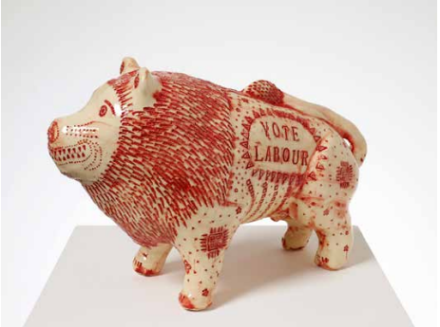The Labour Party came under fire recently for publicly refusing to overturn arts cuts – but in a speech to the Creative Industries Federation at Battersea Arts Centre tonight, Ed Miliband will pledge to “move arts to the heart of government”.

Miliband’s speech will include promises to
- “Widen access to our country’s arts and cultural institutions”, and guaranteeing that national galleries and museums will continue to have free admission
- “Build an economy where young people can succeed” – including requiring creative industries and arts institutions to offer more apprenticeships in return for direct grants or major government contracts
- “Put arts policy at the heart of government” by forming permanent, representative committee on the arts which will be chaired by the Prime Minister
Here’s what Miliband is expected to say:
“I come here with an offer: to put policy for arts and culture and creativity at the heart of the next Labour government’s mission
Arts is an area where Britain still leads the world.
From the film set of the new Star Wars to training the talent of tomorrow as at the BRIT school I was at this morning.
And every day we see all around us evidence of the brilliance of British theatre, design, fashion, architecture, video games and every other branch of arts and culture.
Together, the creative industries are our fastest growing sector.
But the importance of the arts and culture for me goes far beyond pounds and pence.
The arts and culture define our character as a nation whether on the national stage, as at the Cultural Olympiad or in the Edinburgh Festival or locally with the theatre companies at work in every corner of the country, publicly-funded art and culture is vital to our dynamism as a country.
And it can open up new opportunities, helping us come together as a community, whatever our backgrounds, wherever we have come from like at the CAST theatre in Doncaster, where I am an MP and like the youth arts and culture groups in Hackney did just after the riots.
If you believe in social justice, if you believe in a more equal society, then access to the arts and culture is not an optional extra, it is essential – not simply because of the worlds it opens up, but because of the wider impact it has.
Over 40 per cent of 16 year olds from low-income families who engage in the arts and culture score above average in their school tests – and those who take part in the arts and culture are more likely to get a degree.
It is for all these reasons that I am committed to opening up access to the arts and culture because it can’t be right that all of these advantages are the privilege of a few, rather than the right of the many.
If we care about the opportunities for the young, the findings of the Warwick Commission should worry us all.
The number of primary school children taking part in music fell from well over half in 2010, to just over a third by 2013.
The number of arts and culture teachers in schools has fallen by 11 per cent since 2010.
And in 2013, only 8.4 per cent of students combined arts and culture and science subjects at AS level.
In my view, this is a direct consequence of a backward-looking, narrow educational philosophy from a government that has gone from the Gove regime to the Gove regime in all but name.
We have to turn that round.
That is why the next Labour government’s mission is to guarantee every young person, from whatever background, access to the arts and culture: a universal entitlement to a creative education for every child.
And we have a plan to make it happen. If we win the election in a couple of months’ time we are going to strengthen creative education in schools and after-school clubs, build clear paths from school, college and university into the arts and culture or creative industries, and I will use the power of the Prime Minister’s office to raise the status of arts and culture policy and improve provision for young people across the country.
This is our plan to celebrate, enhance and open up the arts and culture in Britain for a new generation.
It is a core part of our plan for Britain as a whole.
Because I believe, and I know so many of you do too, that Britain will be a prouder, richer, stronger country when we give everybody the opportunity to develop their creativity, expand their horizons, enhance their talents and make a life for themselves in the arts and culture: old and young, rich and poor, north and south.”




More from LabourList
‘Labour won’t stop the far right by changing leaders — only by proving what the left can deliver’
‘Cutting Welsh university funding would be economic vandalism, not reform’
Sadiq Khan signals he will stand for a fourth term as London Mayor